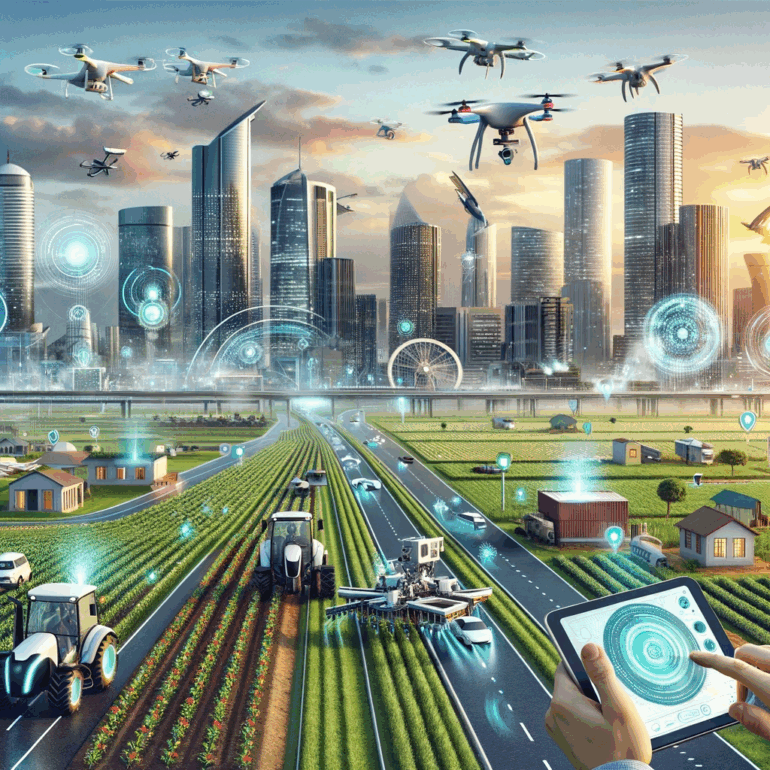Inteligência Artificial: Cotidiano com Tecnologia Avançada

Anúncios
No mundo de hoje, a inteligência artificial (IA) não é apenas uma fantasia de filmes de ficção científica, mas uma realidade palpável que permeia vários aspectos de nossas vidas diárias. Desde assistentes virtuais até sistemas de recomendação em plataformas de streaming, a IA transformou radicalmente a maneira como interagimos com a tecnologia, melhorando a eficiência e personalizando experiências. Este artigo explora os diversos usos da IA no cotidiano, destacando como essa tecnologia avançada está revolucionando diferentes setores e atividades do dia a dia.
Assistentes Virtuais: Companheiros Digitais Pessoais
Anúncios
Um dos exemplos mais notáveis de IA no cotidiano são os assistentes virtuais, como Siri, Alexa e Google Assistant. Esses assistentes utilizam processamento de linguagem natural e aprendizado de máquina para compreender e responder a comandos de voz, facilitando tarefas como definir lembretes, fazer pesquisas na internet e controlar dispositivos inteligentes em casa. Eles se adaptam às preferências do usuário, tornando-se mais precisos e úteis com o tempo.
Sistemas de Recomendação em Plataformas de Streaming
Anúncios
Plataformas de streaming como Netflix, Spotify e Amazon Prime utilizam sistemas de recomendação baseados em IA para personalizar a experiência do usuário. Esses sistemas analisam o histórico de visualização ou audição e as preferências para sugerir filmes, séries e músicas. Essa personalização não só melhora a satisfação do usuário, mas também aumenta o engajamento com a plataforma.
Saúde e Bem-Estar: IA na Medicina
A IA está revolucionando o setor de saúde, desde o diagnóstico de doenças até o desenvolvimento de planos de tratamento personalizados. Algoritmos de IA podem analisar rapidamente grandes volumes de dados médicos para identificar padrões e anomalias, auxiliando médicos no diagnóstico precoce de condições como câncer e doenças cardíacas. Além disso, aplicativos de saúde usam IA para monitorar sinais vitais e sugerir mudanças no estilo de vida para melhorar o bem-estar geral.
Automóveis Autônomos: O Futuro da Mobilidade

A IA também está impulsionando a inovação no setor automotivo, especialmente no desenvolvimento de veículos autônomos. Carros equipados com IA podem processar informações de sensores e câmeras para navegar com segurança, reduzindo acidentes e melhorando a eficiência do tráfego. Embora ainda estejam em estágios de desenvolvimento, esses veículos prometem revolucionar a maneira como nos deslocamos.
Varejo e Comércio Eletrônico: Compras Personalizadas
No varejo, a IA está transformando a experiência de compra. Lojas online utilizam algoritmos para recomendar produtos com base nas preferências e comportamento de compra dos usuários. Além disso, chatbots baseados em IA oferecem assistência ao cliente, respondendo perguntas e ajudando na decisão de compra.
Educação Personalizada
A IA também está fazendo incursões no setor educacional, oferecendo experiências de aprendizagem personalizadas. Sistemas de IA podem adaptar o material didático ao ritmo e estilo de aprendizagem de cada aluno, tornando a educação mais eficaz e envolvente.
Segurança e Vigilância
No campo da segurança, a IA ajuda na vigilância e monitoramento, utilizando reconhecimento facial e análise de comportamento para detectar atividades suspeitas. Essa tecnologia está sendo cada vez mais adotada em espaços públicos e privados para melhorar a segurança.
Desafios e Considerações Éticas
Apesar dos benefícios, a crescente presença da IA em nossas vidas traz desafios, especialmente no que diz respeito à privacidade e ética. Questões sobre como os dados são coletados, armazenados e utilizados são de extrema importância, exigindo regulamentações e políticas claras para garantir que a IA seja usada de maneira responsável e ética.
A inteligência artificial transformou-se de uma ideia futurista em uma força presente e ativa, moldando o mundo ao nosso redor de maneiras significativas e práticas. Desde melhorar a eficiência e personalização em serviços de entretenimento e comércio eletrônico até fornecer soluções inovadoras em saúde, transporte e segurança, a IA está redefinindo o que é possível em várias esferas da vida diária.
O Impacto da IA na Agricultura e Sustentabilidade

Além das áreas mencionadas, a IA também está desempenhando um papel vital na agricultura, ajudando a otimizar a produção de alimentos e promover práticas sustentáveis. Por meio da análise de dados de satélite e sensores no campo, a IA pode prever padrões climáticos, monitorar a saúde das colheitas e aprimorar técnicas de irrigação e colheita, contribuindo para uma agricultura mais eficiente e sustentável.
Outro campo em que a IA está fazendo uma diferença significativa é na gestão de energia e na otimização de recursos. Sistemas inteligentes podem prever a demanda de energia e ajustar automaticamente a produção e distribuição, reduzindo o desperdício e melhorando a eficiência energética. Isso não apenas economiza recursos, mas também apoia esforços globais para combater as mudanças climáticas.
Entretenimento Interativo e IA
No setor de entretenimento, além das plataformas de streaming, a IA está criando experiências interativas e imersivas. Jogos de vídeo e realidade virtual estão utilizando IA para criar ambientes e personagens que respondem de forma dinâmica às ações dos jogadores, oferecendo uma experiência mais rica e personalizada.
IA e o Futuro do Trabalho
A IA também está redefinindo o futuro do trabalho. Embora exista a preocupação de que a automação possa substituir empregos humanos, a IA também está criando novas oportunidades de carreira e exigindo novas habilidades. A colaboração entre humanos e máquinas pode levar a uma maior eficiência e inovação em diversos setores.
À medida que a IA continua a evoluir, seu impacto no cotidiano se torna cada vez mais profundo e abrangente. Enquanto aproveitamos os benefícios que ela oferece, também devemos estar atentos aos desafios éticos e práticos que ela apresenta. A chave para o sucesso futuro da IA no cotidiano reside na criação de um equilíbrio entre inovação tecnológica e responsabilidade social, garantindo que ela sirva aos interesses da humanidade de maneira ética e sustentável.
Em conclusão, a inteligência artificial é uma força transformadora no mundo moderno, com o potencial de melhorar significativamente a qualidade de vida em muitos aspectos. Sua integração em nossas vidas diárias é um testemunho da incrível capacidade humana de inovar e adaptar, e é certo que continuaremos a ver avanços e aplicações novas e empolgantes da IA no futuro.
Escrevo sobre inovação sustentável, consumo consciente e soluções que respeitam o meio ambiente. Meu conteúdo é para quem quer se atualizar sem deixar de pensar no planeta.






